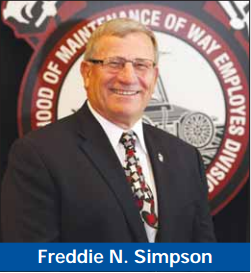2014 December President's Perspective: As union workers, we stand tall for all Published: Jan 30 2015 3:30PM

I am sure that you are proud to be a railroader. Each and every person working on the railroad -- and especially in the track maintenance department -- should hold their selected career in high esteem, because it is honest, important, skilled, and demanding work. I am proud to be your chosen president, elected to represent all you hard-working members as the head of your Union. Together, we make up a vital segment of the rail industry -- a rail industry that is fundamental to both the American and world economies.
As you know, American jobs -- at least the good, fair-paying, secure ones -- are rapidly disappearing. For decades now, American CEOs have greedily sent millions of jobs to China and other low-wage foreign countries. The prevailing reason for this job outsourcing is to cut their payroll expenditures. In other words, they are using cheap labor to increase corporate revenue.
A recent story in the Dec. 15 Washington Post illustrates the growing and unforgivable problem of corporate greed:
"Millions of American jobs disappeared during the 1990, 2001 and 2008 recessions. That’s what happens in recessions. But for decades after World War II, lost jobs came back when the economy picked up again. These times, they didn’t. And it was a particular sort of job that disappeared permanently in those downturns, economists from Duke University and the University of British Columbia have found: jobs that companies could easily outsource overseas or replace with a machine.
Economists call those jobs “middle-skill” jobs. They include a lot of factory work — the country is down about 5.5 million manufacturing jobs since 1990, according to the Labor Department — but also a lot of clerical and sales tasks that can be handled easily from a country where workers make a fraction of what they make here.
In 1979, middle-skill jobs accounted for 57 percent of the jobs in the U.S. economy, according to calculations by David Autor, an economist at the Massachusetts Institute of Technology. By 2009, the share was down to 46 percent. If the share had not changed over those 30 years — if it had stayed at 1979 levels — there would be 15 million more middle-skill jobs in America today."
A familiar refrain amongst railroaders, when it comes to the crippling problem of job outsourcing, goes "you can't rip up the tracks and move them overseas." Indeed, we are fortunate that our railroad jobs are anchored in the American transportation industry. This fact does help our leverage in contract negotiations and increase our overall viability. However, this doesn't mean that the railroads won't try to contract our work out in order to cut payroll costs.
Railroad companies are always looking for ways to shed costs. They would love to eliminate their contribution to railroad retirement and our health insurance benefits. They would welcome shift-work and the reduction of overtime pay. Any policy, law or accepted practice that would increase their bottom line would excite their board of directors and shareholders. We know that less than half of American workers have any kind of pension plan. Most have less than $10,000 in personal savings. Social Security scarcely provides much financial retirement security, and even it is under relentless political attack.
Unionized railroaders like ourselves are an endangered group of the American working class. Increasingly, we are battling rail companies and paid-off politicians, who see us not as hard-working and proud members of society, but as another category on their accounting sheet.
As we enter the next round of National Bargaining on a new agreement, the rail companies will hear from us as a collected labor force. But many other American workers will have no such negotiating voice. It is imperative that we recognize the serious declines if we become complacent. United we stand; divided we fall. As your BMWED President, I look forward to leading the unified charge ahead.